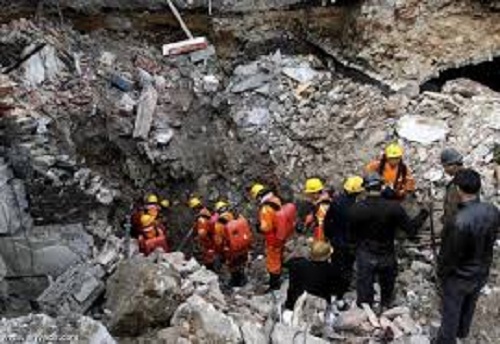This post has already been read 1625 times!
The need to strengthen the solid minerals sector for improved revenue generation, job creation, and overall value addition, has become imperative.
The devastating impact of the coronavirus pandemic and dwindling oil prices has forced a strategic focus on other sectors considered as having high growth prospects, particularly the mineral resources, which had been neglected for decades.
Although many consider the sector porous, and unattractive to investors; all hands must be on deck to rejig the sector, block loopholes, and reposition it for plausible economic value.
The Minister of Mines and Steel, Olamilekan Adegbite, had said artisanal and small-scale operations constitute over 80 per cent of Nigeria mining, which make such illegal practice attractive.He noted that this group, which constitutes an important segment of the sector, operates outside the constituted legal system, and their operations are inimical to the environment and economy.
“The government is determined to mainstream these classes of miners into the legal system for effective management. My Ministry is working with experienced professionals to scale up its knowledge of formalisation techniques and build up its ability on real time data collection of artisanal mining sites in the country to aid their formalisation into mining co-operatives and mineral enterprises. Extension services will also be provided by my Ministry in all aspects of the value chain to ensure adequate management and sustainability,” Adegbite said.
For instance, the national and sub-national governments are agitating for increased revenues from the sector for economic growth. Local communities look up to the industry to provide employment, infrastructure and other benefits, civil rights campaigners expect respect and social equality and transparency from operators, while environmentalists insist on high-standard of performance from operators.
For investors, their investment decisions are based on how well the government de-risks the sector by providing a conducive ecosystem, including investment incentives and geological data at subsidized rates.
According to a report by the Nigeria Extractive Industries Transparency Initiative (NEITI), weak and uncoordinated mineral export process, unsystematic export, uncoordinated tax by the Federal Inland Revenue Services (FIRS), weak implementation and enforcement of the mining law and regulations, among others are key issues undermining the industry.
Experts are of the opinion that if these issues are tackled and the institutional frameworks are strengthened, the industry would live up to the expectation of becoming a major contributor to Nigeria’s prosperity.
She charged the Federal Government to prosecute every project in the pipeline, intensify efforts on on-going reforms, and ensure that the sector is resuscitated.
“We want the Ministry to invigorate the solid mineral sector by strengthening institutions, engaging strategic partners, creating an enabling environment, and boosting knowledge base on every stakeholder.”Baiyewu tasked the Federal Ministry of Solid Minerals to also look into the NEITI audit report, especially in the areas of revenue, internal control, management and administration.
She added that Nigerians expect the Ministry to maximise the World Bank assistance (MInDiver) project to revive the sector, as it was in the first republic. She called on all stakeholders to take actions in diverse ways in the interest of Nigerians.
In his presentation, Director, Mines Environmental Compliance (MEC) Department, of the Ministry, Sallim Ade Salaam, noted that the Minerals and Mining Roadmap was developed as a trajectory for reinvigorating the sector.
He added that the Roadmap seeks to transform the sector through institutions and governance, stakeholders’ engagement, industry participants, geo-science data acquisition, and dissemination and enabling environment.
“After successful development of the Roadmap, the World Bank was engaged by the Ministry of Mines and Steel Development to be the development partner that would help bring this Roadmap to life. This partnership culminated in the establishment of the Mineral Support Sector for Economic Diversification (MinDiver) Project,” he said.
He added that the overall objective of the MinDiver Project is to link up with the Roadmap and enhance its contribution to the economy by strengthening key government institutions, improving information infrastructure and knowledge, and fostering investment in the sector.
In addition, he noted that operators face a range of challenges from insufficient infrastructure to policy uncertainty that constrain investor’s confidence.
He said: “The decline of the sector resulted in reduced focus and leverage from key stakeholders hence flows of talents, resources, partnerships into the sector were hindered. Undue inference in legislation by states, multiple taxations, weak enforcement and inadequate workforce are part of the challenges.
“There was a deficit in relevant requirements such as competitive financing systems, mine and assets security and related support services, for the proper functioning of the sector’s ecosystem.”
Going forward, Salaam proposed the need to improve quality coverage of geo-scientific data gathering in a cost-effective manner that will adequately drive investment growth.
He also recommended: “Effectively monitoring and regulating informal and/or illegal miners; promoting formal small-scale operators through expanding access to funding, and supporting knowledge development to drive local content. To promote junior explorers through sustaining favourable enabling environment to attract low risk exploration investments; improving trading and ease of transactions through the set-up and formalization of metal exchanges and mineral certification authorities.
“Improving the engagements of the states with the minerals and mining sector particularly around financial participation and coordinating oversight with the Federal Ministry. Improving the engagement of communities through coordination of corporate social responsibilities, incentivized participation, and education.”



